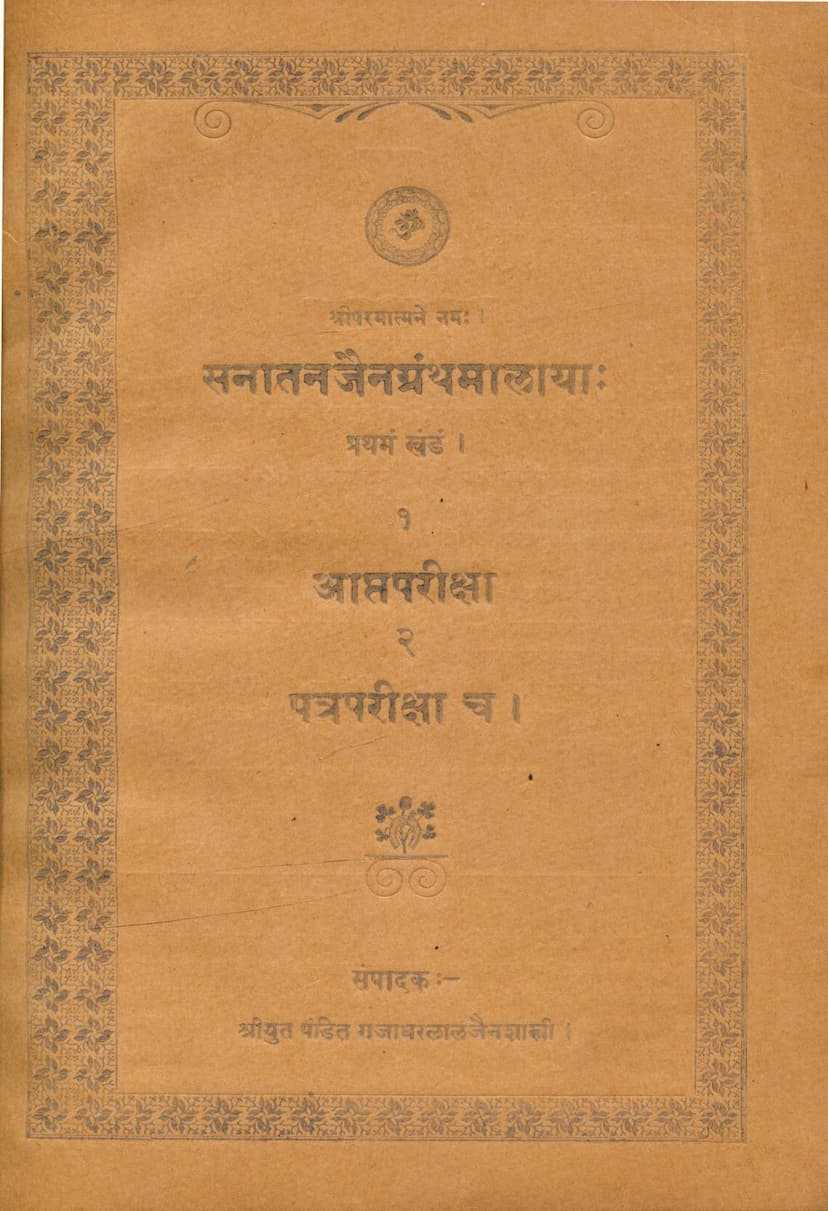Aapt Pariksha Patra Pariksha Cha
Added to library: September 1, 2025

Summary
This Jain text, titled "Aapt Pariksha, Patra Pariksha Cha" by Pannalal Jain, published by Sanatan Jain Granthmala, is a collection containing two key works: "Aapt Pariksha" (with commentary) and "Patra Pariksha" (with its regulations).
The introduction (Prastavana) of the book highlights the challenges faced by Jain philosophy in being understood and appreciated by the broader intellectual community. It expresses a desire to revive and propagate ancient Jain texts, which are believed to contain profound truths about the nature of reality. The author laments the misinterpretations and criticisms leveled against Jainism by other philosophical schools, attributing these to a lack of proper understanding and an unwillingness to engage with the core principles.
The text emphasizes the importance of "Aptavakyas" (authentic words or statements from a reliable source) as the foundation of knowledge. The book aims to present and analyze these "Aptavakyas" from a Jain perspective.
Key themes and content discussed in the provided pages include:
-
Introduction to the Sanatan Jain Granthmala: The initial pages outline the purpose and structure of the Granthmala, which is dedicated to publishing classical Jain works in Sanskrit and Prakrit, along with commentaries. It details the subscription model and the commitment to disseminating these valuable texts.
-
The Author and Publisher: Panna Lal Jain is identified as the minister of the Shri Jain Dharma Pracharini Sabha in Kashi and the publisher of this work, dedicating it to the memory of Kastur Chand and Balchand. The publication date is noted as Vikram Samvat 2439 (1913 CE).
-
"Aapt Pariksha" (Test of the Reliable Source): This section, authored by Acharya Vidyānanda Swāmī, is central to the work. The text delves into the definition and characteristics of an "Apta" (a truly reliable authority). It establishes the criteria for such an authority, implicitly pointing towards the Tirthankaras in Jainism. The book also discusses the nature of proof, the validity of perception (pratyaksha), inference (anumana), and other means of knowledge, aligning them with the Syadvada (conditional predication) philosophy of Jainism. It addresses various philosophical debates and critiques opposing viewpoints, particularly from schools like the Vaigeshikas, Bauddhas, and Sankhyas, defending the Jain perspective with logical arguments.
-
"Patra Pariksha" (Test of the Letter/Statement): This part of the book, also compiled by Pandit Gajadhar Lal Jain, focuses on the analysis of statements, their validity, and the interpretation of language, especially in the context of philosophical arguments. It likely examines how to correctly understand and evaluate pronouncements to determine their reliability.
-
The Life and Works of Acharya Vidyānanda Swāmī: A significant portion of the text is dedicated to biographical details and an overview of the scholarly contributions of Acharya Vidyānanda Swāmī. It mentions his mastery of various subjects, his eloquent arguments, and his prolific writing. It also discusses the various interpretations and identifications regarding his possible names, such as "Patrakesari," and his possible time period and geographical locations, drawing upon inscriptions and literary references. His works, like "Aptamimansa" (which forms the basis of "Aapt Pariksha") and "Ashtasahasri," are highlighted as pivotal in Jain philosophy.
-
Critique of Other Philosophical Systems: The text engages in detailed refutations of non-Jain philosophical systems, pointing out logical inconsistencies and limitations in their epistemologies and ontologies. This includes discussions on the nature of reality, causality, the self, and the means of knowledge, contrasting them with the Syadvada framework.
-
The Importance of Syadvada: The book implicitly and explicitly champions the Syadvada doctrine, presenting it as the most balanced and comprehensive approach to understanding reality, capable of resolving contradictions and offering a nuanced perspective that respects multiple facets of truth.
In essence, "Aapt Pariksha, Patra Pariksha Cha" is a rigorous defense and exposition of Jain epistemology and philosophy, aiming to establish the validity of Jain teachings by analyzing the nature of reliable knowledge and authoritative pronouncements, while also critiquing alternative philosophical systems.